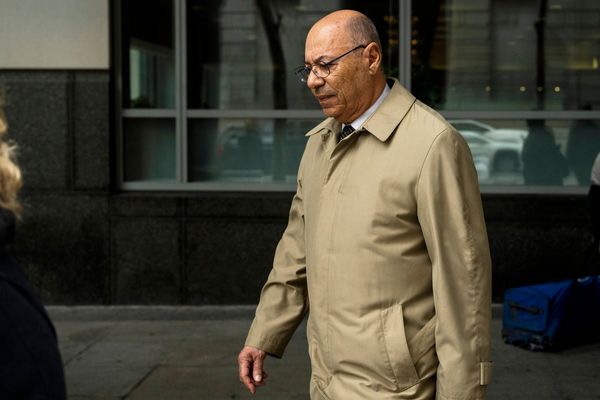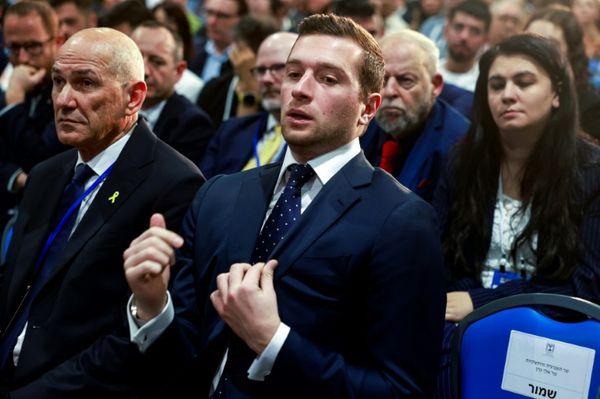
‘BRING DOWN THE TEMPERATURE’
As the dust starts to settle after Donald Trump’s remarkable election victory, America is starting to (or at least trying to) come to terms with the outcome of this week’s vote.
A few hours ago, outgoing President Joe Biden addressed the nation and vowed a “peaceful and orderly transition”. He also urged Americans to “bring down the temperature” after the most extraordinary and divisive of campaigns. Reuters reports Biden told those disappointed by Vice President Kamala Harris’ defeat: “Setbacks are unavoidable. Giving up is unforgivable. A defeat does not mean we are defeated.” He added: “You can’t love your country only when you win. You can’t love your neighbour only when you agree.”
The 81-year-old claimed his time in office had been a “historic presidency”, the BBC flags, adding: “We’re leaving behind the strongest economy in the world. Now we have 74 days to finish the term, our term, let’s make every day count.” Of Trump’s victory he also said: “I hope we can lay to rest the question about the integrity of the American electoral system: it is honest, it is fair, and it is transparent.”
As the BBC notes, while Biden attempted to pick up Democrats devastated by Harris’ loss, there was no nod to the blame game within the party. But then again, he was hardly going to say “told you so” or “you were right I should have dropped out earlier” in his Rose Garden address.
The New York Times states that Jaime Harrison, the chair of the Democratic Party, has rebuked Senator Bernie Sanders who caused waves when he said in a statement: “It should come as no great surprise that a Democratic Party which has abandoned working class people would find that the working class has abandoned them.”
Reposting Sanders’ statement, Harrison wrote on X: “This is straight up BS … There are a lot of post-election takes and this one ain’t a good one.”
Meanwhile, 78-year-old Trump is set to pick his cabinet in the coming “days and weeks”. CBS News flags his transition team, former Goldman Sachs CEO Howard Lutnick and former Small Business Administration administrator Linda McMahon, said in a statement: “President Trump will be selecting personnel to serve our nation under his leadership and enact policies that make the lives of Americans affordable, safe and secure.”
If you’re wondering if they’ve got around to finishing all the vote counting, I’m afraid not. At the time of writing Trump sits on 295 electoral votes and Harris has 226, with the soon-to-be 47th president currently around 4.5 million votes ahead in the popular vote.
Two states, Nevada and Arizona, are yet to declare, and control of the House of Representatives is not yet confirmed. The New York Times states “the diminishing number of uncalled races suggests the Republicans will hold a slender majority” in the House.
WHAT TRUMP 2.0 MEANS FOR AUSTRALIA
The question everyone has been asking since it became clear Trump was going to win the US election is “What does this mean for me?”
Well, back home the Australian press is keeping everyone nice and calm with headlines like “Trump’s victory could wipe $36b from Australian economy” and “A second Trump presidency would put Australia on a collision course with the US”.
In actual events, the AFR quotes senior government members in claiming Australia’s relationship with the president-elect is off to a good start, given Prime Minister Anthony Albanese “was relatively high up” the list of world leaders Trump spoke to in the hours and days following his victory.
Albanese told Parliament on Thursday: “We affirmed the strong relationship between our two nations and committed to working together for the benefit of our people, including through AUKUS.” He added: “As prime minister, I have made it a priority to invest in relationships with world leaders to build trust and respect in Australia’s best interests. I built that with President Biden and I will do so with president Trump.”
Talking of building trust and respect with Trump… a certain former prime minister and current US ambassador has made headlines around the world after deleting tweets about the incoming president, including some calling him “the most destructive president in history” and “a traitor to the West”, the ABC reminds us. Kevin Rudd said in a statement the comments had been deleted “out of respect for the office of president of the United States”. He added that he did not want them to be construed as reflecting the views of the Australian government.
The ABC flags Albanese and Foreign Affairs Minister Penny Wong have been at pains to reinforce their support for Rudd staying in Washington, while The New York Times says “it remains to be seen whether Mr Rudd’s past criticisms of Mr Trump will affect relations between Australia and the United States”. The paper also makes the point that many others have made — that Trump may want to revisit the AUKUS agreement when in office and “Australia could also be vulnerable to fallout from any renewed trade war between Washington and Beijing”.
That fear over what Trump might do with the US economy, whether tax cuts, the promised/threatened tariffs, or the deportation of millions of undocumented workers, is what is fuelling the headlines about how he could impact Australia. The Sydney Morning Herald flags the Australian dollar lost value against the US dollar as investors bet the rise in debt needed for Trump policies could require higher interest rates. The paper flags Reserve Bank assistant governor Christopher Kent telling a Senate hearing Trump’s policies would probably mean higher US long-term interest rates and inflation, which would impact the global economy (incidentally, the Federal Reserve just announced it’s cutting its key interest rate by 0.25 percentage points).
The ABC flags 96% of Australia’s imports to the US are currently tariff-free and Albanese will be hoping to avoid Trump’s promise of putting a 10% tariff on most imports bound for America, with claims China could be hit with tariffs of up to 60%. RBA governor Michele Bullock also told estimates this week: “There’s so many unknowns here. He [Trump] said he will do these things. We don’t know. So, basically we have to look at what that might imply at first pass. It might not imply a hell of a lot for us.”
Basically, to the question posed at the top, no-one really knows.
What can be plotted is the impact of inflation this year. The trend has been highlighted in a pretty stark manner by John Burn-Murdoch over at the Financial Times, who reminds us “2024 was an absolutely horrendous year for incumbents around the world”, adding “People *really* hate inflation!” in a piece that shows incumbent leaders have really not fared well these past 12 months. The AFR made a similar point with its piece “Inflation kills incumbents. Not that Labor needed a reminder”.
On domestic matters, Rudd wasn’t the only Australian making global headlines yesterday (no, not Raygun’s retirement) as Albanese’s social media ban attracted plenty of attention, such as the BBC’s “Australia plans world’s first social media ban for under-16s”. This morning AAP says experts are split on the proposed ban. The national cabinet is meeting today to discuss the plan and yesterday the prime minister said: “I am confident that tomorrow, when the national cabinet meets, we will ensure that there is a single system going forward to ensure uniformity. That is so important. We know that this is not the only solution. We know there’s more to do.”
The newswire quotes researcher Samuel Cornell from UNSW’s School of Population Health as saying the plans were a positive step, while RMIT Professor of Information Sciences Lisa Given said it would likely give parents a false sense of security while excluding young people from critical information.
ON A LIGHTER NOTE…
In a very transparent continuation of bringing you pictures of cute animals to counter the state of the news cycle… Two police officers have found their pictures in the news after adopting a pair of kittens they discovered in a hedge.
PCs Pete McKinnon and Ross Brant found the four-month-old cats abandoned in a box in Wolverhampton, England. After a vet checked the kittens and found they were well, the pair needed new homes — and up stepped the police officers.
Wolverhampton City Centre Inspector Sophie Clement is quoted by ITV News as saying: “It’s great to see how caring these two are. Our officers do always strive to have the best cat-ittude, so give them a wave and say hello when you see them out and about in the city.”
Seriously check out the pictures (again). It will cleanse your timeline (again). The first pic is particularly great.
Say What?
It was a terrible night for everyone who voted against him, and guess what? It was a bad night for everyone who voted for him too. You just don’t realise it yet.
Jimmy Kimmel
The US late-night hosts are picking up where they left off at the end of the last Trump administration and used their opening monologues on Wednesday evening to express their disappointment and sadness at Donald Trump’s victory. Kimmel was on the verge of tears as he delivered his, Sky News reports.
CRIKEY RECAP
Trump’s economic policies aren’t a continuation or extension of previous Democratic policies, as many of Nixon’s were. Instead, Trump himself has dragged the Democrats to the left on economics. “Bidenomics” was an embrace and expansion of Trump’s protectionism during his first presidency, combining economic policy with America’s geopolitical goal to suppress a rising rival in China, to halt China’s rise while delivering blue-collar American jobs — thus signalling that the economy could work in favour of the working class and middle-income earners in a way it hadn’t in the decades since Reagan.
The lesson from this week’s election, however, is that delivering economically is not enough, not anymore. The Democratic Party has survived since the Nixon years by cobbling together coalitions of minority voters with the white working class — enough to regularly deliver control of Congress, elect three presidents and win the majority of votes even when they didn’t win the White House. Having learnt from Trump to shift back leftward on economics, the Democrats now face the much more difficult task of switching to the right on issues like migration, minority rights and values, which are likely to shear off sections of the coalition, leaving them to left-wing groups outside the Democrats.
In short, if this was a bizarre version of 1968, the next election might be one of 1972, in which the Democrats openly split between minorities and white working-class institutions like unions. Trump, theoretically, can’t run again, and seems too exhausted to serve his coming term, let alone another. But he has shown a path for future Republicans to take the white working class, perhaps in a way that shifts them permanently to the GOP, nigh on 100 years since FDR completely changed American politics with the New Deal.
Harris ends on the adage that “only when it is dark enough can you see the stars” and reiterates the “extraordinary promise of the United States”. She exits alongside her husband Doug, and the camera starts zooming into the crowd, looking for and finding a lot of tears. The speech is pitched pretty much entirely to her supporters. There’s a little bit about how people should be “looking in the face of a stranger and seeing a neighbour” — which makes sense, when the person you’ve called a fascist and a threat to democracy just won the popular vote.
Indeed, the moment that gets the most rousing cheer is when, after cursorily acknowledging her call to congratulate Trump, Harris insists her side will engage in a “peaceful transfer of power”. That’s all that’s left to cheer about. Unlike the 45th, and now the 47th president of the United States, the Democrats will go quietly.
There weren’t ballots in all states, including in those where women are dying. There was no ballot in Georgia where ProPublica has linked two deaths to the state’s abortion ban. There was no ballot in Texas where two women reportedly died after they faced delays in getting miscarriage care. There was no ballot in Oklahoma where a woman with a life-threatening pregnancy was told to keep bleeding out in the parking lot until she was “crashing”, or in Alabama where a woman with the same condition was denied care. Abortion is now restricted in about half of US states with devastating and documented impacts.
After casting his vote in Florida, Trump snapped at a reporter when he was asked about Florida’s suffocating abortion ban, telling the journalist he “should just stop talking about that”.
Millions of Americans voted in favour of abortion rights at this election and it is unlikely they’ll let him stop talking about an issue that impacts an enormous swath of the population.
READ ALL ABOUT IT
Democrats join 2024’s graveyard of incumbents (The Financial Times) ($)
Trump victory is a major setback for climate action, experts say (BBC)
Trump’s victory adds record $64bn to wealth of richest top 10 (The Guardian)
Germany’s economy is in trouble. The government’s collapse and Trump’s return bring more risk (abc news)
Bank of England cuts rates but sees higher inflation after Reeves’s budget (Reuters)
THE COMMENTARIAT
The manosphere won — Brian Barrett (Wired): Donald Trump will once again be the president of the United States. It wasn’t especially close. Which came as a shock, unless you watch or listen to Theo Von. Or the Nelk Boys. Or Adin Ross. Or Andrew Schulz. Or Shawn Ryan. Or sure, yes, Joe Rogan, but he’s the one you’ve definitely heard of.
You’re going to hear a lot of people attribute Trump’s win to all kinds of reasons: inflation fatigue, immigration fearmongering, President Biden’s doomed determination to have one last rodeo. But he owes at least part of his victory to the manosphere, that amorphous assortment of influencers who are mostly young, exclusively male, and increasingly the drivers of whatever monoculture remains in an online society that’s long since been fragmented all to hell.
It was on these podcasts and streams that Trump spent a disproportionate amount of time in the final weeks of his campaign, and for good reason. That list above — plus Tucker Carlson — includes the four biggest podcasters on Spotify. Trump sat with all of them, often for hours, reaching millions of conservative or apolitical people, cementing his status as one of them, a sigma, a guy with clout, and the apex of a model of masculinity that prioritises fame as a virtue unto itself. For many young voters who weren’t paying attention in 2016 and 2020, a generation that overwhelmingly gets their news from social media feeds rather than mainstream outlets, this was also their first real exposure to Trump.
Joe Biden’s legacy: Made Trump Great Again — The Herald’s View (The Sydney Morning Herald): Biden remained a problem for Harris even when he quit the race. His fumbles and missteps on the stump were hugely destructive. His comment that Trump supporters were “garbage” in the last days of the campaign was reminiscent of Hillary Clinton’s “deplorables” gaffe in 2016 and had Harris putting out fires. Harris was never able to get out from behind his shadow. She was not perfect, but Biden left her too little time to prove herself to American voters.
The Democrat leadership’s historic failure to counter economic inequality and abandonment of America’s working class continued under Biden and finally prompted the angry working class to return the favour and abandon Harris.
The Democrats are now a smoking ruin and Biden has gone from the man who saved America from Trump to the guy who helped him recapture the presidency.








